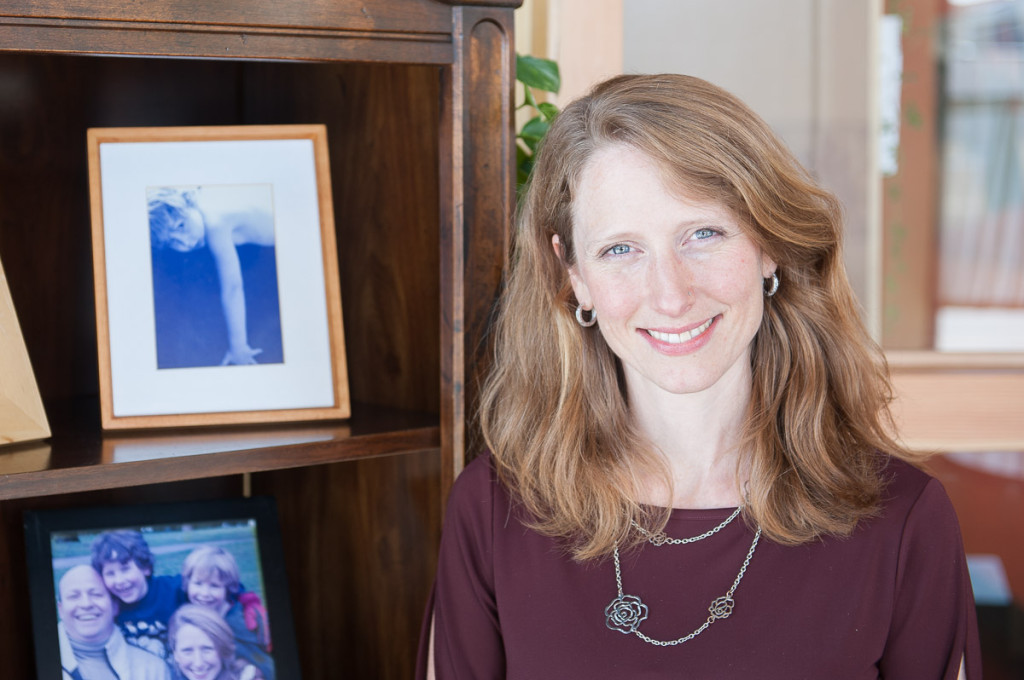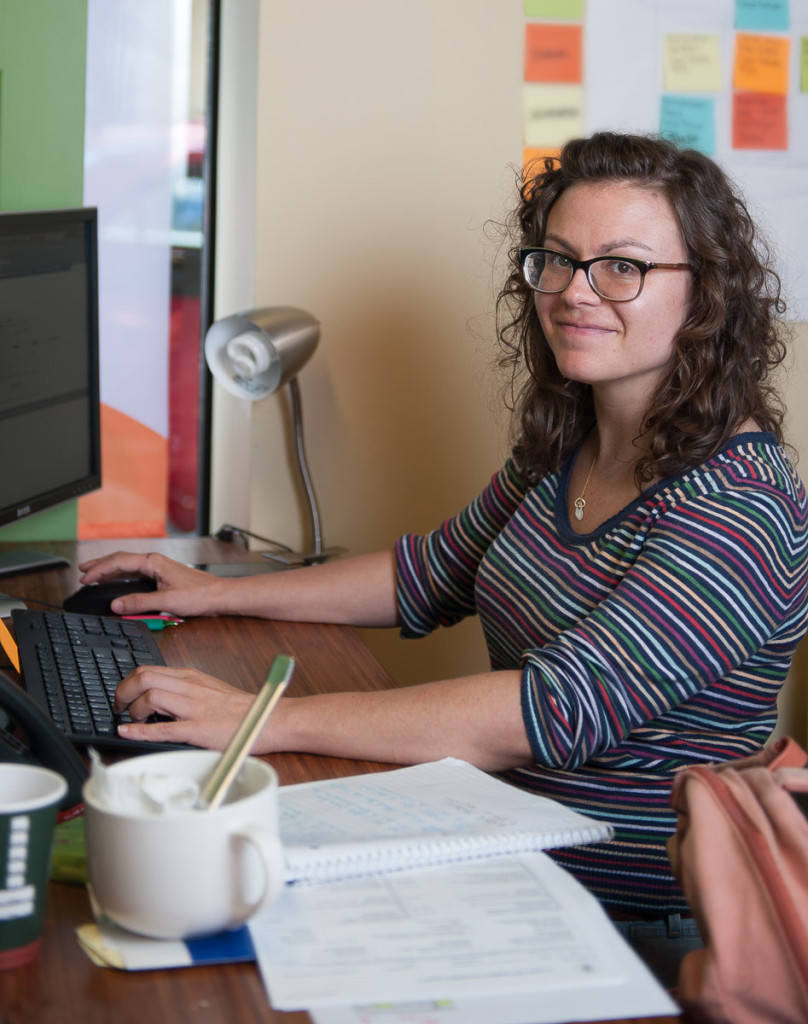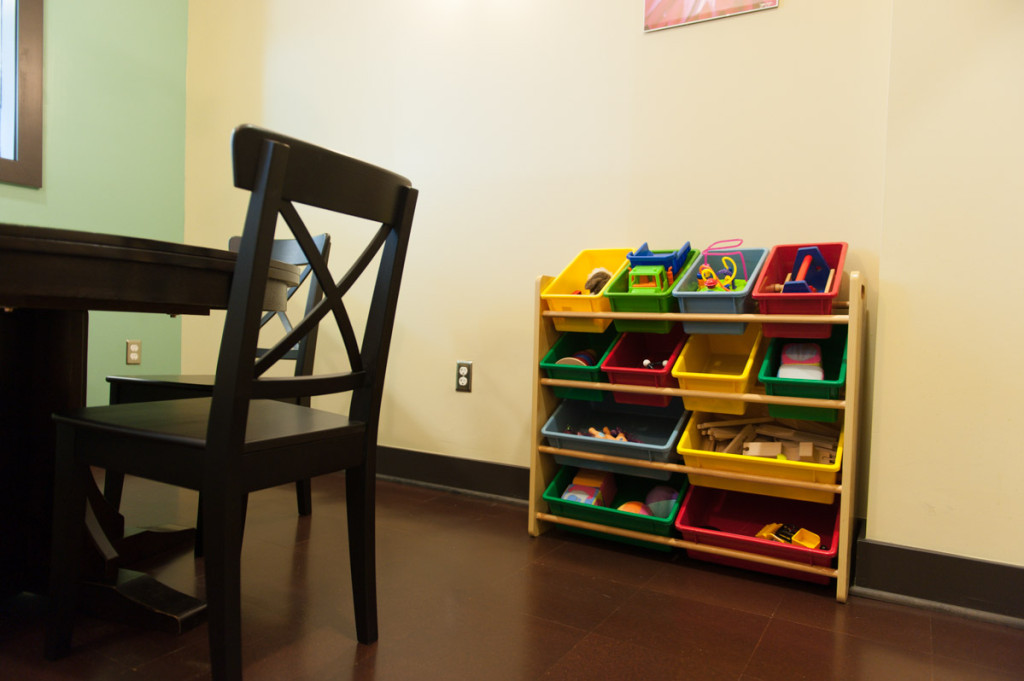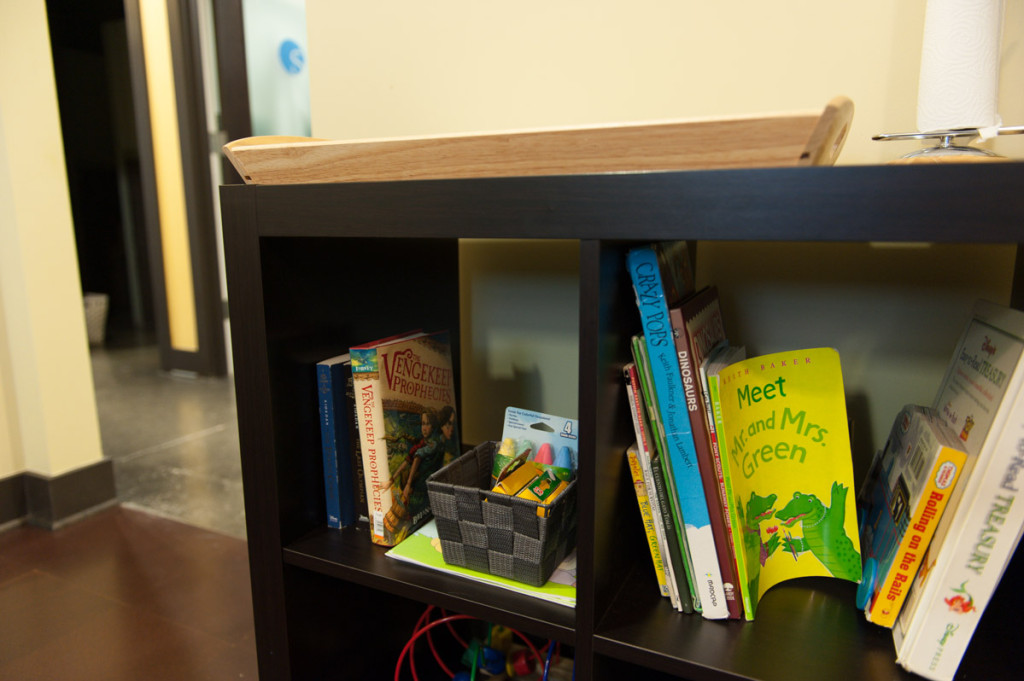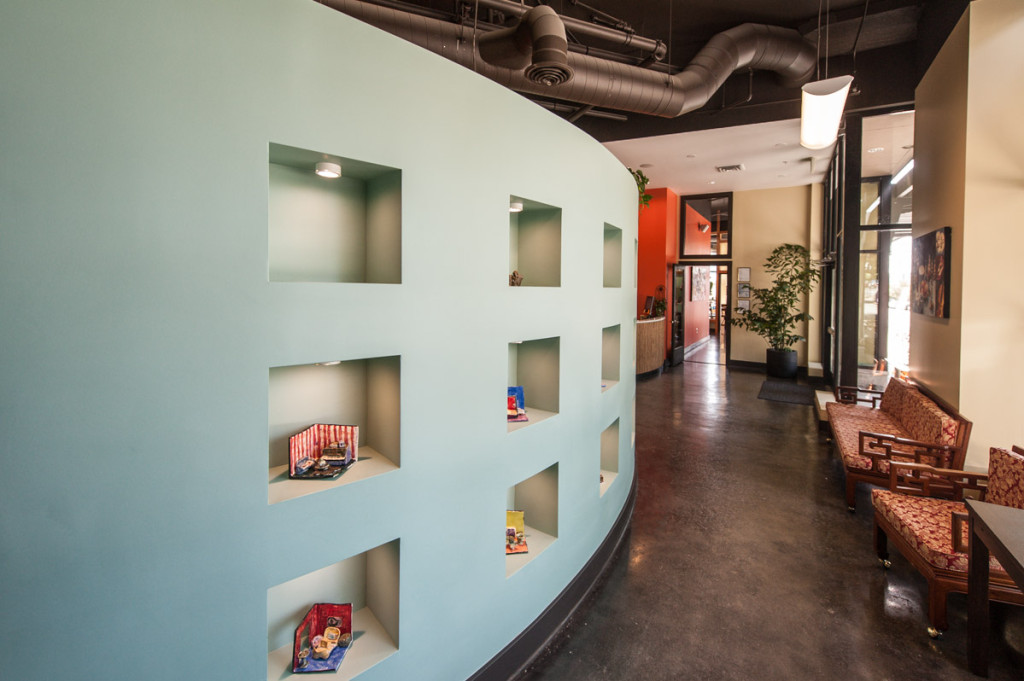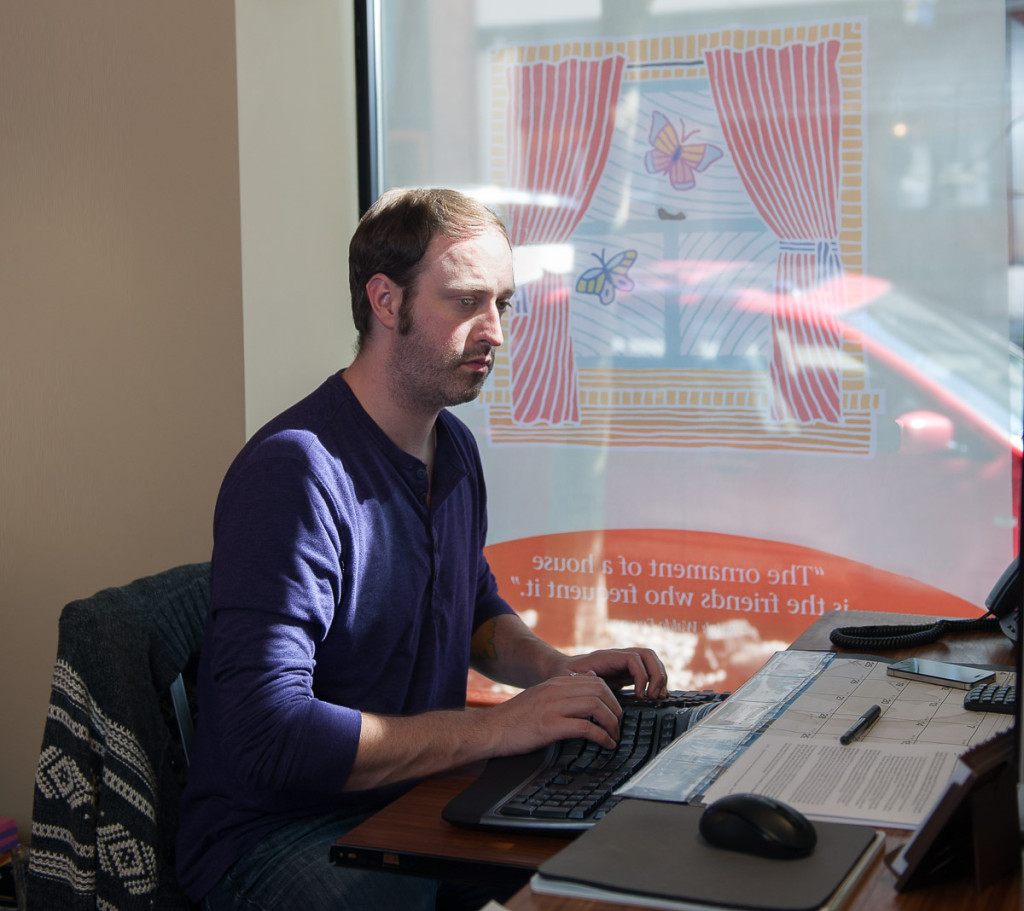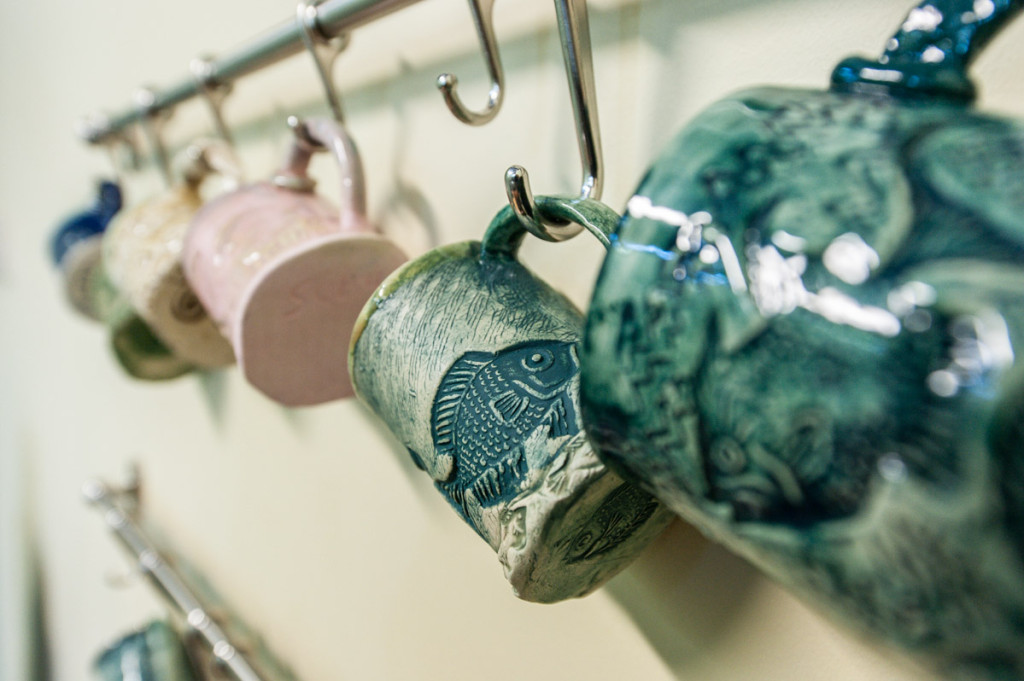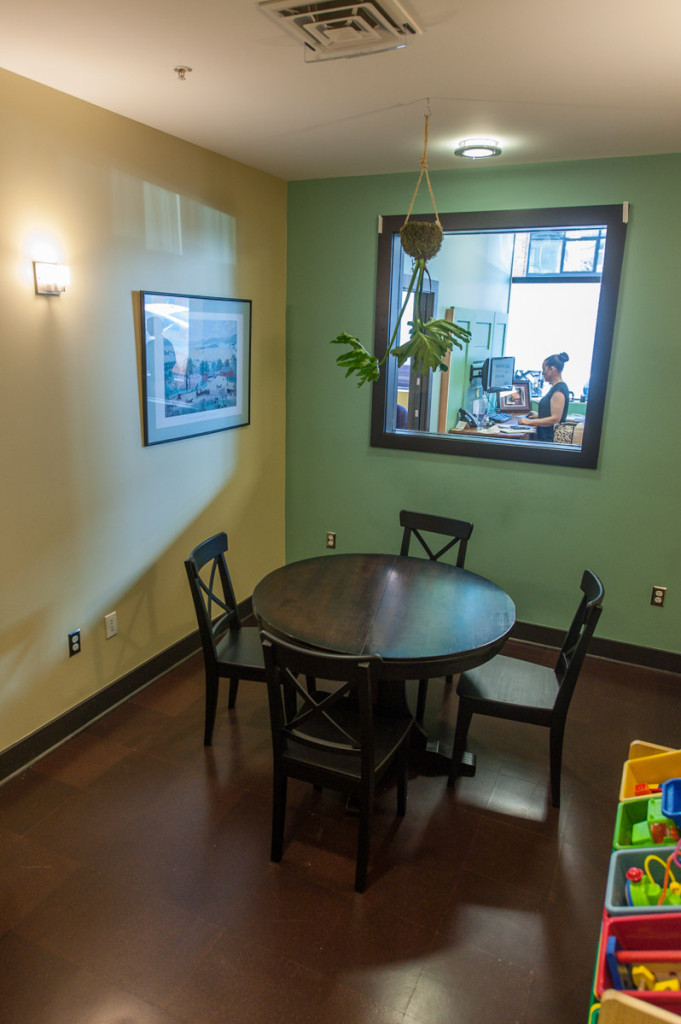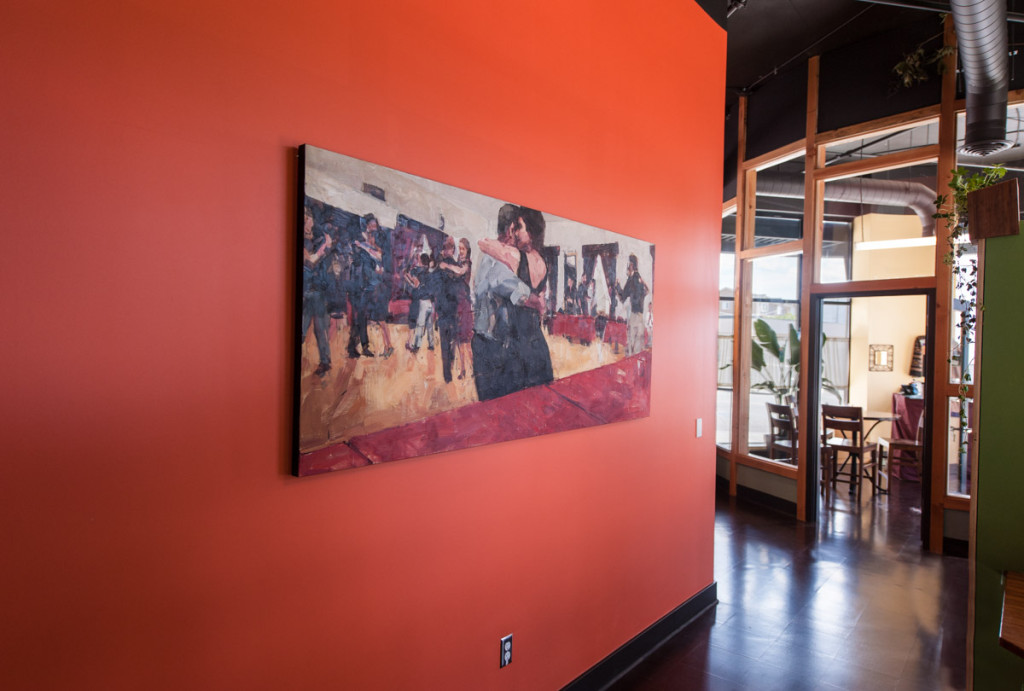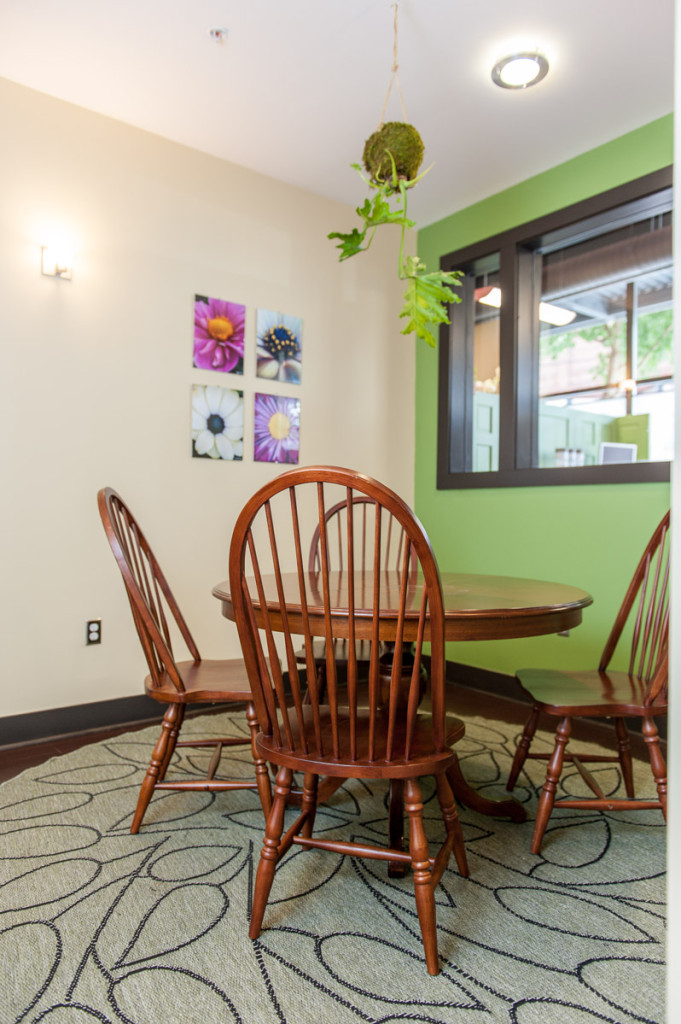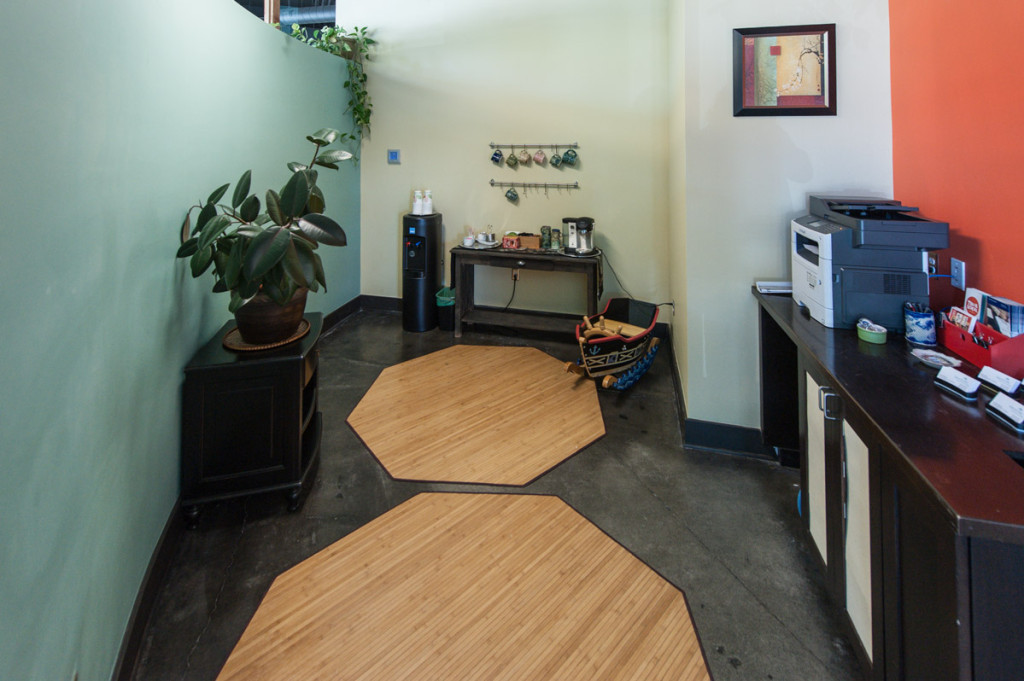Lori: In the spring, we interviewed Jacob and Susan of Office Nomads. The last question we usually ask is “When you hear ‘self-created, soul-satisfying work space’ who do you think of?” Jacob thought of you instantly.
What work is done here?
Ruby: We are a mortgage brokerage. And over the last several years, many of the small brokerages, unfortunately, have not been able to survive the meltdown of the economy and the mortgage industry at large. I think a lot of what has helped us survive is being open to, and creative around, our workspace. And attracting people who appreciate that and who are also looking for that.
So we help people buy homes, and refinance homes. Finding the money for their house at whatever transition or life phase that they’re in, and what’s needing that money at that time. It’s an exciting time in people’s lives.
How long have you been working together as a business?
Ruby: I’ve owned Salmon Bay since 2006. I joined the industry in 2002. And the industry has transformed a lot [we both laugh] over that time. I had no idea. I never would have fathomed what I was actually doing when I decided “Oh! I’m going to start a mortgage company!”
I couldn’t find a company that I liked at the time, in 2006. I had worked at a brokerage. I had worked at a bank. And found that broker rates, and the sheer deal that you can offer somebody, is so much better than the cost of the money at a bank. But at the time, in 2005-2006, the broker culture was really tainted with questionable ethics: a culture that I did not want to participate in. So it was the basic question of “Can you provide good rates and good customer service – have the product be good and the culture be good?” Because the bank culture typically had a little more ethical environment. And I decided “Yes!” Those two pieces are completely independent and from there decided to start this company.
Lori: It’s interesting. Two of our other stories have been here in Ballard: Martina of Swift Industries who makes panniers, bicycle bags, and Kevin of NWPeaks nanobrewery, beer makers. That same thing – something to do with the ethics or the politics, I couldn’t find what I wanted, so I had to start my own – that’s the third time I’ve heard that here in Ballard. [Ruby laughs, says “Yeah.”] So you’re in great company here in Ballard!
How did you end up doing this work to begin with?
Ruby: I have a degree in social work, mental health. And went down to Argentina for a bit, because I was frustrated with the job opportunities as a social worker in Seattle. And came back, and had a 7 month old and knew I didn’t want to go into social work. I’ve always loved math. Always thought I would end up as a math teacher. The mortgage industry was booming. I needed a job. So started processing. And then got pregnant with my second son, and hated the mortgage industry. Couldn’t go job hunting pregnant. But by this time, it was like the mafia, I knew too much. [Lori belly laughs.] It’s like once you know.
Because you can’t go to school to become a loan officer. So, it was like “Well, ok, now I know this. And I have two children. How can I make it work?” And that was a lot of what inspired starting.
Lori:
How did this space come to be your work space? What’s its story, its history?
Ruby: It’s funny that Jacob thought of me. Because he was thinking of our last space, where, when I got pregnant. [laughs] So, each child has inspired a change or had some major impact on the development of Salmon Bay. And so, I have four sons. Son number 3, he was born, and I was looking for someone to help me. And found this phenomenal woman to help, but when she was referred to me, the fellow was like, “Oh you have something in common!” And I was thinking music, but no, we had the same due date. She was pregnant too. And I was like “That’s not helpful!” [we laugh together] But she was too wonderful to not incorporate into the office, so what it inspired was having a nursery.
We found a work space that the top floor was a nursery, the second floor was where we worked, and the bottom floor was where we saw clients. Each floor was 550 square feet, we’re not talking large floors here. It was a townhouse. And it became just the most phenomenal work/life balance you could ever imagine. Because we could run up stairs, nurse, come back, keep working. There wasn’t that anxiety of I don’t see my baby all day. And the babies were together. And it was because there were two that that happened. When half your company has a new born, you figure it out. That was the last space. Those babies are now going into first grade.
So that space then got filled up with people working, then filled and filled and filled. And what was an ideal work environment became too cramped. We got to the point where we were literally wearing medical face masks because every time someone sneezed we all got sick. We were in each other’s faces. Trying to be on the phone all the time was really difficult. We had three people sharing one desk. It was just to the point where either we start firing people, we downsize, or we grow. And I’m not one to downsize. [we laugh together] That’s no fun. So we started looking for a space.
Lori:
How many people were with the company at that point?
Ruby: There were 10. There are 12 now. But 10 at the time, crammed into 1,400 square feet. So, I embarked on this. “Ok, let’s find a space.” At first I thought I’d lease something. I started looking at commercial lease agreements, and they’re terrible! The renter is completely on the hook for everything. So I said, ok, I’m going to sell the property and buy something.
My requirement was that I don’t want something square or rectangular, because I don’t want that feeling. I don’t want to feel like a bank. I don’t want to feel like a bank, because I don’t like walking into banks. So I don’t want to walk into that environment everyday with the cubicles, and the beige walls, and the just soul-sucking-ness of it.
Lori: We get it. When we switched from Bank of America to BECU credit union, it was partly for that. We walked into BECU and all of the people sitting there were wearing fleece. And we were wearing fleece. And we’re like “Hey, it’s our people!”
Ruby: Our people, exactly. Exactly. There have been times when folks have said “Oh, people aren’t going to believe that you’re professional, or you’re trustworthy, or you’re this.” And I was like “If somebody needs a Bank of America feel, then they should go to Bank of America. They will never trust me! [Lori laughs] They will never be comfortable with me.” So I’m not going to try to cater to them. And there are lots of banks. Let them! That is a niche that is covered.
I believe that there is also an unserved niche of people that need to buy houses, or refinance a house, who can’t stand the idea of talking to anybody that relates to that world. So let’s create a space for them. For us, and for them.
So then we found this place. It was about to get auctioned. It was a hair salon before. So there was a major remodel that was required. I did not anticipate the majorness of the remodel, it took me completely by surprise. I didn’t have any experience with it. And you don’t know what you don’t know. So that’s been a very trying last couple, 9 months, in that, in the move. But in the end, I am thrilled with the space that was created.
Lori: Yeah, sometimes naivety is good.
Ruby: Oh! If I had known how long it would take and how expensive it would be, I never would have done it. But I did it! We had to move out of the old place. I don’t know what I would have done. I just don’t think I would have done this. But, here we are! And it really is the dawn of the next era.
Lori:
What are some of your favorite things about this space?
Ruby: Lots, lots of things I love about the space. Probably the workstations stand out the most. At one point I had someone bring in a cubicle, like from Craigslist, the used cubicles, brought it in, set it up, and we all just shook our heads and said “We can’t go there.” Even if it is the cheapest way to go. And we were trying to stay on budget. And I love to imagine. So we’re like “How can we upholster it? How can we like? If we put Indian tapestries over the cubicle will it be better?” But it was just polishing a turd. [We laugh together.] It’s still an office cubicle.
And so I got this notebook, and drafted all these different cubicle ideas, out of PVC piping, out of plumbing stuff, out of fencing material, out of bamboo, out of doors, all these different things, and brought it to the contractor, and said “Do any of these make structural sense?” Because at the old office, we’d moved everybody to standing desks. And because standing desks are very expensive, we had boots made for our desks. Had someone come in, measure everybody to their height, and had a boot made to push the desk up. But then we can only hire somebody that tall. So if we’re looking for a new processor, “We’re looking for a 5-foot, 9-inch processor.” [We laugh.] Not sustainable. So we had to come up with a new solution for standing desks and that aspect really complicated it. There’s lots of desks that you can find out there that are not height adjustable.
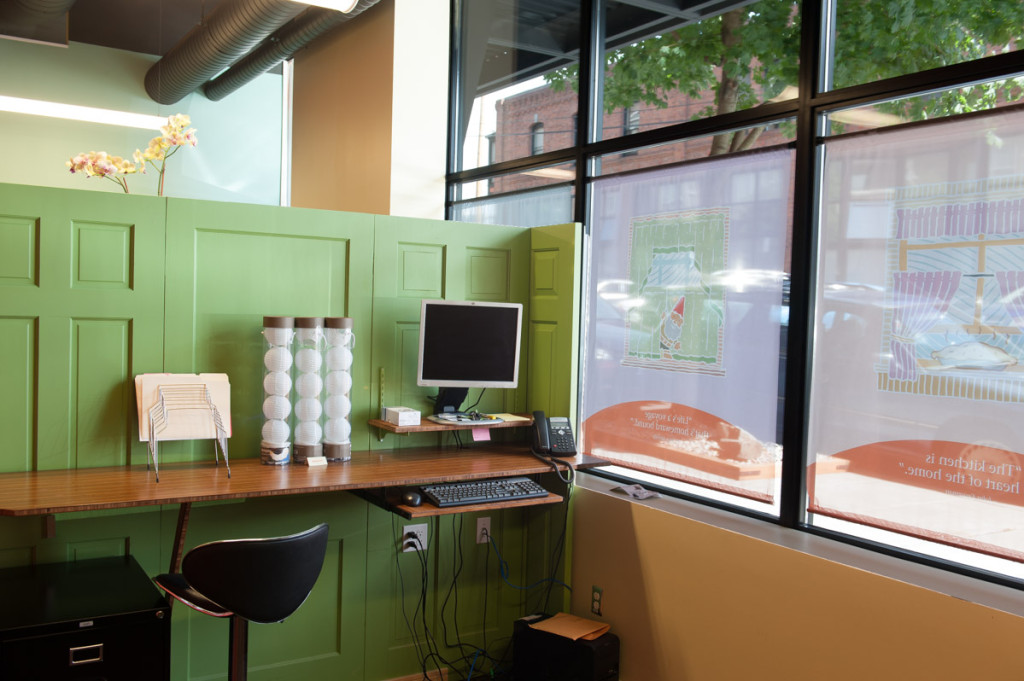
So we created these doors – and the whole thing was green built, sustainable, recycled/recycleable materials – so all of the desks are set at the height of the person, if they want a pull out drawers, completely customizable to what they want. It’s been a pain, not as smooth as I anticipated, because it requires drilling, and we’ve moved some monitor’s down, then there’s holes in the door so you’re spackling. But the idea is that someone is here for a long time. We’ve had very little turnover. So it’s a bit of a pain in the beginning, as we get their desks set up, and then it’ll be set up. And then they’ll have a space that they can really enjoy being at.
A lot of what I love about the space is that it’s very much based around the idea of a healthy body. So we’ve got the desks. In the copy room, we’ve got a bar that you can hang from, hang upside down from, so that if you’re throwing in big stacks of tax returns, and you have those two minutes where you’re sort of fidgety, hang upside down! Stretch your back out! Those little moments. The idea is that it can really create a better quality of life.
When I pulled everybody aside, asking “What do you love? What do you hate?” and they all said “I love my work. I hate sitting.” Ok, great, let’s fix that. So the inversion bar. We busted down a wall to create the inversion bar. I wasn’t going to bust it down to put a shelf there, but there was this small space that was awkward. And once we realized we could create a healthier environment with it, we did.
Lori: The doors are awesome. What you said earlier about which people will trust you. It reminds me of, we have gathered, over the years, friends who are makers, builders. They make furniture, handmade furniture, handmade metal sculpture, and YOU became a maker to do this. So you became a whole group of people in Seattle who you could now be serving, or probably are serving already. That’s really cool.
Ruby: It’s fun, working around. Like there’s these glass walls, and there’s a similar one for the conference room. A lot of it was, at the old space I didn’t have an office. And it wasn’t really functional to not be able to close a door. You need to have a private conversation when you’re working with payroll. But, I’m still concerned, now with me being separate from everybody. It’s not a part of the culture that I want to promote. So by having it glass, and rounded, I think helps keep the culture that I’m hoping to promote.
The paint was phenomenally costly. And so important. At the old space we had a big orange wall right when you walked in. “Not beige” is as much of an office ethic, almost, as anything else, and something that’s not found in the finance industry. You look at so many other industries and a colorful environment is like, “Well, duh.” But you go to finance and everyone looks at you like you’re crazy. So that’s another big piece.
We have a Take-5 room. So if you need to have a private conversation or take a power nap. We’re going to put a punching bag in there. It can be a really stressful job. Sometimes you have to tell somebody “You can’t buy your house.” Bad news. So to have a place where someone can, afterward, decompress, is important. Also I do have four kids, so the chances of a kid being sick, it has to stay family friendly, both for clients and myself. And that’s somewhere I can put my kids if they are sick and I need to keep working. So maintaining that life/work functionality. I can’t really say balance, because nothing feels balanced. But functionality is also important.
We have three client meeting rooms. I didn’t want to take up floor space with plants but I wanted to have plants so they all have plant chandeliers, which was fun to find. And one of the rooms is all decked out for kids, so that kids can be in there and play and their parents can have a functional meeting.
We also have – what we didn’t have before – we have a room for classes. We want to grow the financial literacy component of the company, so now we have the space to do that.
We also have a place, which I’ve never seen before in another office, for borrowers to photocopy their own tax returns, their own stuff. Because everybody’s home printer is broken, or out of ink, or something. You don’t want to send somebody to Kinkos. So we have a space for them to come in and get their paperwork ready, so that’s now all set up. It’s industry-specific, but I’m excited about it.
Lori:
What are some of your favorite things about the neighborhood that you sit in, the community?
Ruby: The reason it’s called Salmon Bay Community Lending, is because I live across the street from Salmon Bay park. And at the time I was working at a bank, and they were saying “Oh, you’ve got to cold call relators, you’ve got to do, you know. Get out there, get out there, get out there!” And then I’d be pushing my kid on the swing and somebody’d say “Oh, you know, I’m thinking about buying a house.” And I was like “Really? I can help you out with that!” And those were always the most wonderful transactions. You create wonderful connections and friendships. So when it came to starting a company, I wanted to give credit to what has built it. So we’re very much based on, and for, the community. I live right here. My kids are at Salmon Bay school. [We laugh together.]
A couple of years ago we worked to put a traffic circle in front of Salmon Bay Park. A huge mess: one of those things that really shouldn’t be as hard as they are. [We laugh.] And now that we’re in this new space, we’re looking forward to really getting more and more involved in other volunteer projects. I’m also involved in the Ballard Chamber, and they’re doing wonderful things to improve the neighborhood and connect the business community.
Lori: Yeah, it’s an exciting place to be. We noticed that when we were talking to Kevin, back in December. He was saying that there’s something like 7 or 8 of these little itty bitty nano breweries in Ballard. And wouldn’t it be cool if there was a walk you could go on? Fun! Lots of fun things happening around here.
Ruby: It’s true.
Lori: So our creative partner Bas, and I, we’ve been doing interviews with people who love their work, love their work spaces and.
[Loud, group clapping, and bells ringing, are heard] What is that?!
Ruby: Every time a loan funds, we ring bells, and call out and holler. So that was a loan funding.
Lori: Nice! That’s totally cool.
We’ve been gathering stories now for something like, almost 2 years, of people who have been doing what they feel like they should do to what they love to do. And created spaces that they love around them. And we ourselves have done that. We’ve moved from the corporate world to working for ourselves as writers and story gatherers. We feel like we’re part of a culture of people who are doing that, but we don’t quite know what to call it. We talk about culture a lot. What culture are we part of? So I always ask a question about culture, because we’re trying to figure out what the heck we’re part of.
Do you consider this work, and this space, part of a culture, or cultures, or part of an emerging culture? And if so, what do you call them?
Ruby: I think we’re part of an emerging culture. One of the challenges that I’m dealing with right now. For the first time we have desks, that we can fill, instead of just being tapped out of space. And I’m not sure how to find the loan officers to fill them. Because, generally speaking, I don’t care for the culture of my industry. [We both laugh.]
And so how do you find the people that are still stuck in offices that they don’t enjoy? I don’t want to just start cold-calling people and doing that head-hunter thing. And it is so important. We’ve had a few people just kind of pass through Salmon Bay and it’s generally people where it didn’t feel like a good cultural fit. No one has left Salmon Bay to work at another mortgage company. It’s always been that they’re getting out of the industry, or going back to being a mom, or one guy was just done with mortgages. But finding people that fit within our culture is a definite challenge, since it is NOT the dominant feeling of the mortgage industry at large.
I’ve also recently been getting involved with, am on the board of the Washington Association of Mortgage Professionals, and active on the Government Affairs Committee. With the feeling of, there is an old guard that is on the verge of retiring. I want more of this feeling [gesturing to the whole of Salmon Bay]. So sitting back and waiting for it to happen is not a position I’m willing to take. So, I’m trying to get involved to help draw people out of the woodwork who have similar feelings and ethics. No, I don’t want to say ethics. There are a lot of really, really good bankers. The ones that are left, generally are the ethical ones. But fun. You know, we really, sincerely care about each other, and care about what we’re doing outside of work, and enjoy spending time together.
And have that same balance when we’re on the phone with borrowers, when we’re working with our clients, with the utmost professionalism. And 120% dedication to making it work, for getting what is best for their situation. And then once you’re off the phone call, being in a safe environment to be able to be, like “Baaaah! I can’t believe this! This is so frustrating! Or dysfunctional, dah dah dah da.” You know, all the things that make a job hard. Being in a safe environment to be able to express that and not be like, “Sorry, you have to take that home.” Because none of our spouses, our loved ones, want to hear about it. [We laugh]
Lori: I’m not sure if I heard your answer. What do you call your culture here?
Ruby: We’ll just say “It’s so Salmon Bay.” “That is so Salmon Bay!” [We laugh.] Our own culture. There isn’t a larger one that we fully feel we’re a part of. Unfortunately.
Lori: That’s cool. You’re a pioneer. Based on your experience here,
What suggestions would you give to someone either considering leaving a job they hate, or creating their own work space, or evolving their workspace into something more soul-satisfying?
Ruby: I’d say to not be afraid to dream it. But really get it clear. Like when we created the last space, of the babies on the top floor. It was from saying “Wouldn’t it be great! If we could have the babies on site, if my husband was there half the time, and nanny was there half the day, and we could work. Wouldn’t that be phenomenal?” And then make it happen.
I think a lot of people start with what is available. I like that, don’t like that, like that, don’t like that. And then it’s hard to really know what direction to go in if you haven’t clearly identified what the ideal situation is.
Like when I first told the relator “I’m looking for a space that’s not a rectangle or a square. Because I don’t want three sides of walls and one wall of windows.” And he looked at me like “You want a commercial space that’s not?! What?!” you know. [We laugh.]
But then, by identifying that, we walked in here and I was like “This is funky! It’s a triangle! Kind of like a guitar pick shape! How fun!” And because it was identified, then we could act on it with much more decisiveness than if that vision hadn’t been clear ahead of time.
Lori:
When you hear “self-created, soul-satisfying work space” who do you think of and why?
Ruby: The person who comes to mind is in Vancouver, Washington. The first folks that come to mind are called Broker Knowledge Group. Ken Perry makes mortgage compliance fun.
Lori: Whoa. [laughs]
Ruby: Whoa. Right? [laughs] And they just moved into a new space. They painted and built out a warehouse in a big storage unit complex kind of thing. We went down to Vancouver for their opening, and in support of “Ok, you’re another. You’re probably one of the, or the one other office!” And we sort of grab onto each other like “Ok, you’re the other office in this industry that feels like, has the same energy, that we have and want to help grow.”
So Broker Knowledge Group, in Vancouver. In the industry, off the top of my head, that’s what comes to mind.
Lori: You’ve been doing this for a while now.
What are you doing and thinking about today that you weren’t working on two or three or four years ago?
Ruby: The biggest thing is now trying to help shape the industry at large. Getting involved in the government issues.
Just Tuesday I filmed a political video for a bill that we’re trying to help get passed. And I’ve never been in that arena before. It’s not something I’ve had the time to participate in. But because of having grown, I’m no longer originating loans. I’m not helping collect bank statements, pay stubs, get the loan app. So because that’s not on my plate, I’m now able to reach out and start working in the larger arena.
I’ll be going to the National Association of Mortgage Brokers in October. Really looking forward to making those connections, in a world that. I mean, I was raised by shrinks, artists, and musicians. No one ever worked in banking in the long lineage of my family and my community! [We laugh together.] So I’m looking forward to trying to make a mark.
Lori: Thanks so much, Ruby, and everyone at Salmon Bay Community Lending. Industry-changing pioneers, you’re doing Ballard proud!

